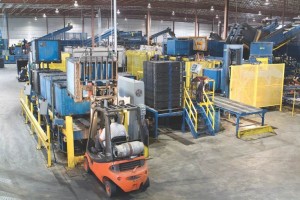MEC uses panel appointment to push for more recycling and composting, less landfilling

Michigan’s landfill-first approach to waste management is getting a much-needed overhaul, and MEC is helping to lead the charge.
For more than a year, Deputy Policy Director Sean Hammond has served on the state’s Solid Waste and Sustainability Advisory Panel, created by the Department of Environmental Quality to review part 115 of the Natural Resources and Environmental Protection Act, which regulates solid waste management. The SWSAP also includes the MEC member group Michigan Recycling Coalition, along with local governments, waste industry representatives and others. It is distinct from the Governor’s Recycling Council created a year earlier specifically to increase residential recycling rates.
The 13-member panel recently put forward its draft recommendations for input from Michigan residents. The Department of Environmental Quality is accepting public comment on the proposal until Monday, August 1. (You can comment on the draft recommendations here.) After incorporating those comments, the SWSAP will present its formal recommendations to the DEQ director this fall, and the plan will eventually go before the Legislature for approval.
In our view, Michigan has been too reliant on landfills to manage our waste stream. That’s because the last time the state updated its solid waste policy, in the 1990s, there were concerns that we were running out of landfill capacity. As a result, Michigan built more landfills than we needed, which in turn created extraordinarily low costs for disposal. Today there are more than 45 landfills statewide.
As MLive reported recently,
In each landfill, there’s treasure getting buried. A new DEQ-funded university and business study found that Michigan garbage contains an estimated $368 million worth of recyclable material. The largest chunk, 13.6 percent, is food waste that could be converted to energy through composting or anaerobic digestion.
Michigan waste experts say as much as 40 percent of landfilled garbage is organic material that can’t necessarily be composted, but could be digested.
The study concluded 42 percent of thrown-away materials have market value, including all standard recyclable commodities except glass, plus textiles.
Through the SWSAP, we are working to capture more of that value and conserve resources by encouraging recycling, composting and electricity generation (via anaerobic digestion) so discarded materials can be put to their best, highest use.
Here are some highlights from the SWSAP’s recommendations for Michigan’s solid waste policy:
Rename it. The panel’s first draft recommendation is a change of terminology. The proposal calls for replacing the term “solid waste planning” with “materials management planning” to reflect a shift away from the landfill-first approach and toward an emphasis on recycling and composting.
The proposal also says that materials management plans—which each county is required to file with the DEQ—should include goals for reclaiming reusable materials and metrics for monitoring the county’s progress toward those targets.
Boost composting. Turning food waste and other organic matter into valuable compost makes good environmental and economic sense, and composting provides many jobs in Michigan. Unfortunately, although composting facilities have been required to register with the DEQ since 2008, minimal oversight has allowed a few bad actors to give the industry a black eye by producing nuisance odors and otherwise being un-neighborly. Those conflicts have made it difficult to find appropriate sites for composting facilities.
The draft recommendations call for driving out bad actors by providing a more robust regulatory framework for composting—one that includes general permits, routine inspections, and enhanced requirements for site plans, operating and training.
The proposal also notes that Michigan should continue its ban on landfilling yard waste, a valuable source of nutrients that should be composted.
Protect taxpayers. Landfill operators are required to provide financial assurance so the DEQ and Michigan taxpayers aren’t on the hook for cleanups, maintenance or other costs if the company goes out of business. However, those financial assurances aren’t always enough to cover all costs.
The SWSAP proposal calls for increasing the financial assurance requirement such that the DEQ is able to contract with a third party to properly close and maintain a landfill. The same goes for all solid waste facilities. It also recommends raising fees or adding new funding sources to grow the state’s account for the perpetual care of retired sites.
Pay for the program. Of course, the DEQ and local governments will need adequate funding to administer the materials management program and enforce regulations that protect human health and the environment.
We are happy to have a seat at the SWSAP table and look forward to finalizing these recommendations. Keep an eye out for more updates as we move forward with this plan to conserve resources and create a more sustainable Michigan.
###
Recycling plant photo courtesy Schupan Recycling.



Comments are closed.